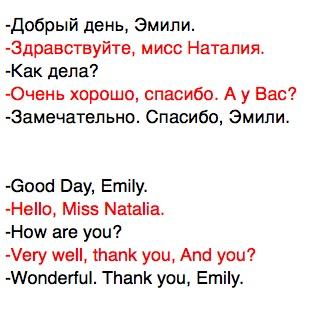Sounds like cognates are the single greatest friend to folks learning Russian. However, as with most good things there are pitfalls. And these pitfalls are called 'false cognates'. A 'false cognate' is a word that shares a similar pronunciation between two languages, but means one thing in one language and something else in the other. You'd sound pretty silly if a Russian asked you what you were doing ('Что вы делаете?') and you'd answer 'Я читаю магазин' (which means 'I am reading a store')....
'False Cognates" examples.
The dialogue at the beginning of the show:


8 comments:
Just wanted to say Im enjoying and learning from the show. Here in Amsterdam, I now share the things Ive learned with my Russian colleague and she has lots of fun both correcting me and giving me other tips. Thanks for you hardwork on this podcast!
Thanks for the encouraging words, Mark! 'Привет' (preevet) to your Russian colleague from me!
Thanks for your show Наталя. Just a little note on your false cognates - surname is British English and is not widely used in America, where last name is more common.
I had an experience with a false cognate that turned out to be very funny. Last summer, I finally went with my Russian wife Olya to visit her family in Moscow, Troisk, Belgorod and Vilnius, Lithuania.
After struggling for ten years to learn a little Russian (I am mostly fluent in French and -- of course -- English, but I find it hard to stay disciplined enough to learn new languages), I found I was able to communicate sort of, at least a bit beyond the usual Bolshoi Spaseba and Gidye Twalet.
But once in Belgorod, where I was in the position of trying to impress the intimidating Russian doctor in the family, I found the dinner table was where the pressure really grew. So much food, so many chances for this Gloopy Americanits to offend them!
The doctor, Valeriy, and I, it turned out, had developed something of a rapport. He spoke no French or English, but he did speak Russian and German. Neither of which were familiar to me. Somehow this qualified us to communicate to each other.
He learned "eat" in English, and he would constantly force new pieces of food on my plate, and I would follow suit by grabbing some food and putting it on his plate in answer. (Thank God he wasn't so forceful when it came to the Russian beer and *gulp* vodka!)
Finally, at the point of bursting with all the food I ate, I went through my French and English words in hopes of finding a word he would understand.
After placing a Russian meatball on his plate with a dramatic flourish and with an intent stare in his face, I said, in my best Russian accent, "Truce?"
He turned to face me, apparently a bit surprised, and his face softened, and smiled, and he repeated back to me "truce!" He ate his food, I ate mine, and for the rest of our week there, "truce" became our bond.
But over the next two weeks, my wife seemed to have more of a chuckle than I would have thought appropriate over this random discovery of a talent for Russian. She shared this story with friends and relatives, and everyone seemed surprised that I was able to grab such a random word out of the air. So surprised that it just didn't add up.
So finally, I grabbed my Russian-English dictionary and sounded out the word "truce" in the Russian side of the dictionary.
And I learned that "Truce" means "Coward" in Russian.
I spent the next few days trying to replay every conversation I thought I had with Valeriy, desperately hoping I hadn't offended him, and trying to get some sense of dignity out of the exchange.
Truce!
VSmirk,
that is funny:))))) Thanks for sharing the story. СПАСИБО!
Hi!
I'm from Mexico... I "discovered" your blog today... and listened to a few lessons... I just wanted to say I really like it!!! take care and have a nice trip!!!
Is there any way of reuploading the false cognates list? The link is dead here.
plz, try the link again
Post a Comment